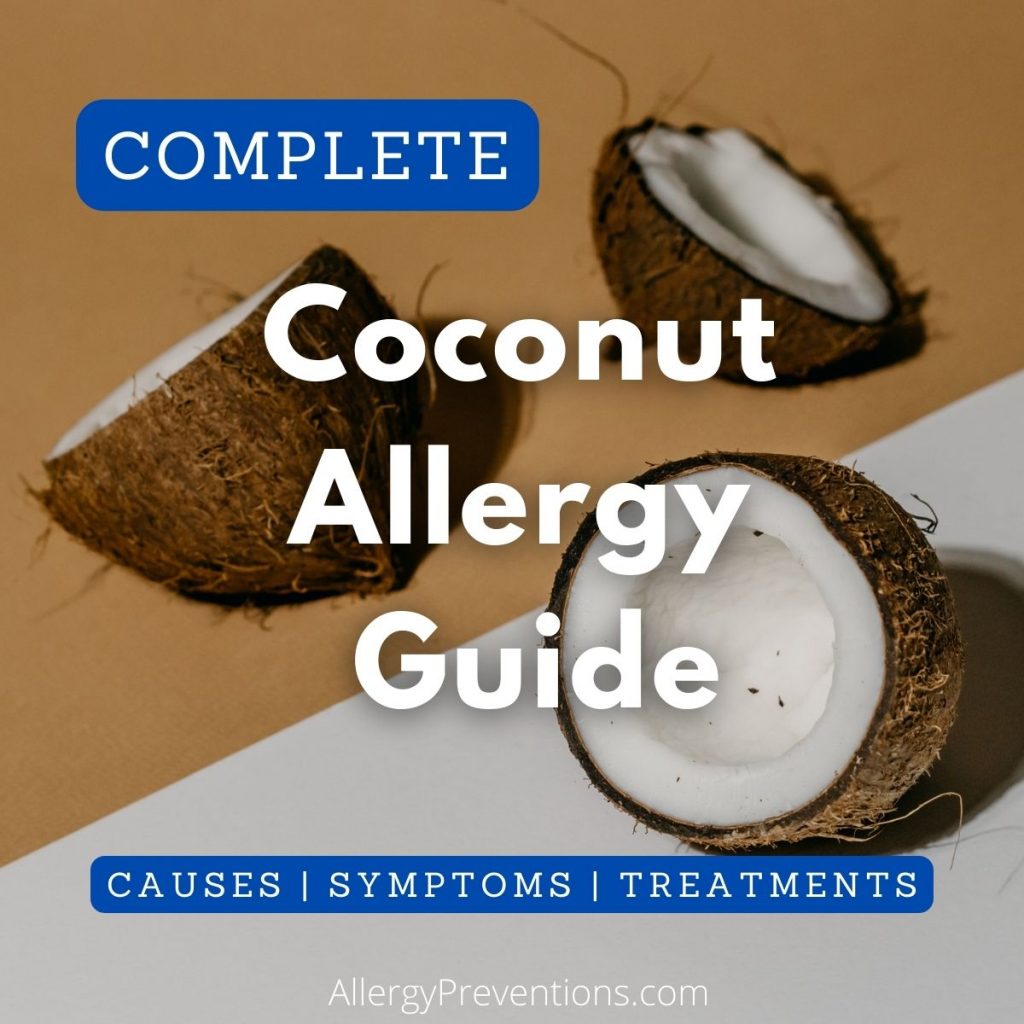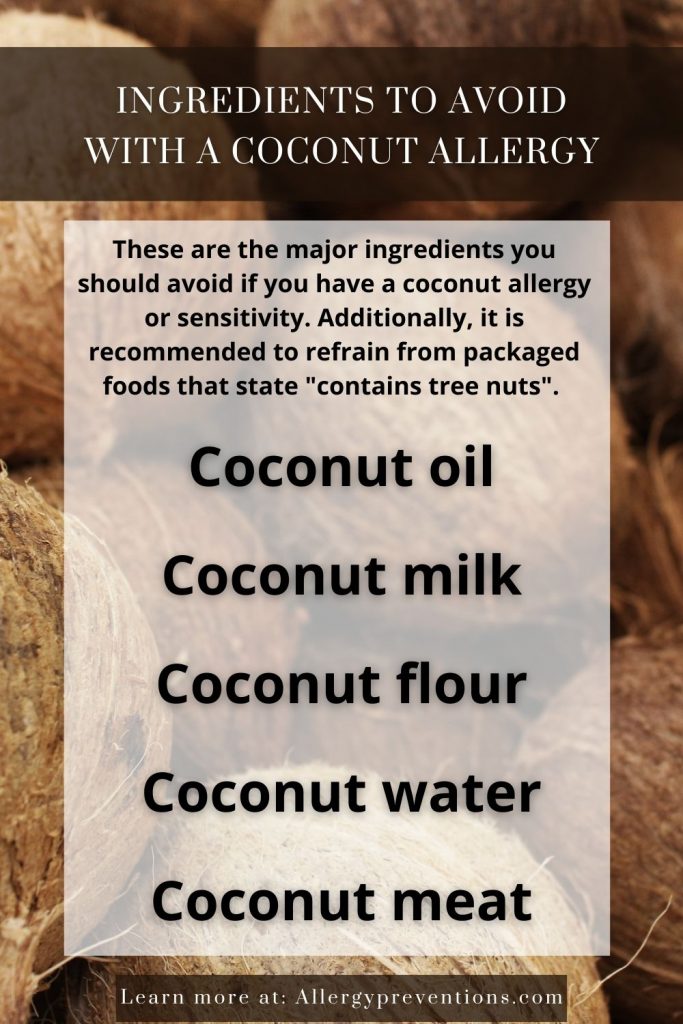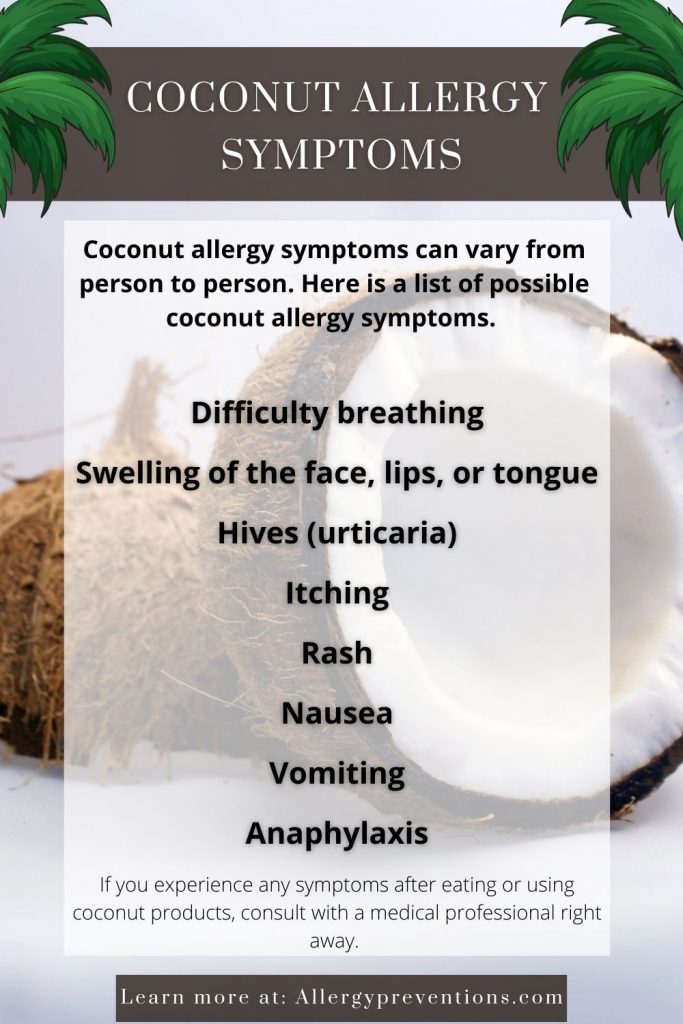Do you have a coconut allergy? If so, you need to read this guide! We will discuss everything coconut allergy-related, from the signs and symptoms to treatments and products to avoid. Stay safe and symptom-free by following our advice!

Table of Contents
Can someone be allergic to coconut?
Yes, coconut allergies are relatively rare, compared to other food allergies, but they can occur. The coconut tree is part of the palm family, which also includes grasses, wheat, and other plants that people can be allergic to. Coconut allergies usually develop in adulthood and are more common in women than men.
Is a coconut a nut?
Coconuts are classified as fruits, not nuts. However, the FDA classifies coconut (Cocos nucifera L.) as a tree nut for food labeling purposes. This means that people with a coconut allergy may also need to avoid products that state they contain “tree nuts” on their labels.
Is coconut an allergen?
Yes, coconut contains several allergens that can cause an allergic reaction. The coconut tree is a member of the palm tree family. The proteins found in coconut are similar to those found in other tree nuts, such as walnuts and cashews. These proteins can trigger an allergic reaction in people who are allergic to them.
Ingredients to Avoid with a Coconut Allergy

If you have a coconut allergy, it is important to avoid all products that contain coconut or coconut derivatives. Regarding packaged foods with “contains tree nuts” labels, these should be avoided as well if you suspect they may contain coconut. Here are the major ingredients you should avoid with a coconut allergy or sensitivity:
- Coconut flour
- Coconut meat
- Coconut milk
- Coconut oil
- Coconut water
Symptoms of a coconut allergy
The signs and symptoms can vary from person to person. Some people may experience more minor symptoms like a rash, or itchy skin. Others may experience more severe symptoms after eating coconut. If you experience any of these symptoms after eating coconut, seek medical assistance.
List of coconut allergy symptoms

- Difficulty breathing
- Swelling of the face, lips, or tongue
- Hives (urticaria)
- Itching
- Rash
- Nausea
- Vomiting
- Anaphylaxis
If you have a (severe) coconut allergy, be sure to carry an EpiPen with you at all times in case of an emergency. An EpiPen is a device that injects epinephrine, a medication that can help to stop a severe allergic reaction. Discuss with your medical provider to find out if an EpiPen is required.
What is a contact dermatitis coconut allergy?
Contact dermatitis is a type of allergy that causes a red, itchy rash. Coconuts can trigger this rash when you touch or come in contact with coconut products. If you have contact dermatitis from coconuts, you must avoid all contact with coconut products. Treatment for contact dermatitis includes the use of corticosteroid creams and oral antihistamines.
Is there coconut in beauty products?
Yes, coconut is often used as an ingredient in beauty products, such as body lotions, hair care products, and soaps. If you have a coconut allergy, check all beauty products’ labels before using them.
Did you notice that the label does not list anything coconut but you are reacting? Reach out to the manufacturer to find out if the coconut derivative is under an uncommon coconut name.
Can a coconut allergy be outgrown?
Yes in some cases, people with coconut allergies may eventually outgrow them. Our immune systems and environmental factors are always changing. However, it is still important to avoid coconut products even if you think you may have outgrown your allergy. Discuss the best way to reintroduce coconut products with your doctor.
Diagnosing coconut allergies
If you think you may have a coconut allergy, see an allergist for testing. An allergist can perform a skin prick test, blood test, or food challenge to determine if you are allergic to coconut. Once your allergy is confirmed, the allergist will work with you to create a treatment plan. This plan may include avoidance of coconut products and the use of medication to treat symptoms.
Skin Prick Test
A skin prick test is a common way to diagnose coconut allergies. During this test, a small amount of coconut extract is placed on the skin and then pricked with a needle. If you are allergic to coconut, you will develop a red, itchy rash at the site of the prick.
Blood Test
A blood test can also be used to diagnose coconut allergies. This test measures the levels of coconut-specific antibodies in your blood. If you are allergic to coconut, your blood will contain high levels of these antibodies.
Food Challenge
In some cases, an allergist may perform a food challenge to confirm a coconut allergy. This test is usually done in a hospital or clinic setting. During the test, you will be given small amounts of coconut to eat. The allergist will then monitor you for signs and symptoms of an allergic reaction. A food challenge is considered the gold standard for diagnosing food allergies.
Treating coconut allergies
There is no cure for a coconut allergy, but the symptoms can be managed with a combination of avoidance and treatment. If you are allergic to coconut, you should avoid all products that contain coconut or coconut derivatives. If you accidentally eat or use a product that contains coconut, taking an over-the-counter antihistamine may help relieve your symptoms.
Need more Coconut Allergy Information?
Check out Coconut Derivatives Allergy and Coconut Oil Allergy: What You Need to Know for even more coconut-related allergy goodness.
